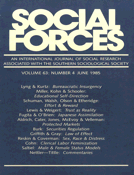-
Views
-
Cite
Cite
Karen A. Miller, Melvin L. Kohn, Carmi Schooler, Educational Self-Direction and the Cognitive Functioning of Students, Social Forces, Volume 63, Issue 4, June 1985, Pages 923–944, https://doi.org/10.1093/sf/63.4.923
Close - Share Icon Share
Abstract
This paper reports an analysis of data from a small but substantially representative nationwide sample of white students in seventh grade through college. We propose and measure a concept, educational self-direction, by which we mean the use of initiative, thought, and independent judgment in schoolwork. Reciprocal-effects causal models show that the degree of educational self-direction exercised by students, in particular the substantive complexity of their schoolwork, has a decided impact on their cognitive functioning. Cognitive functioning, in turn, affects the exercise of educational self-direction. Separate models for secondary-school and college students confirm these findings at both educational levels.



